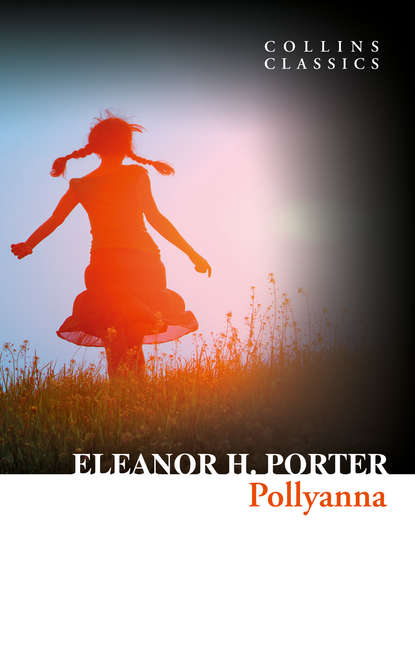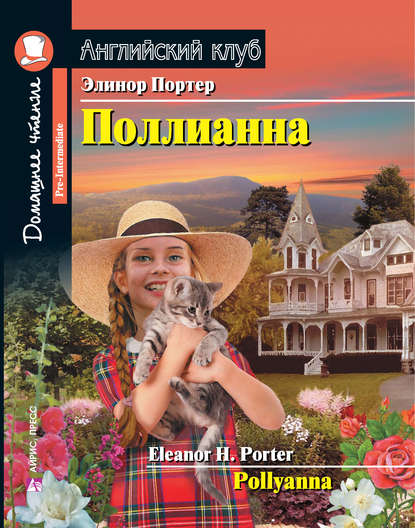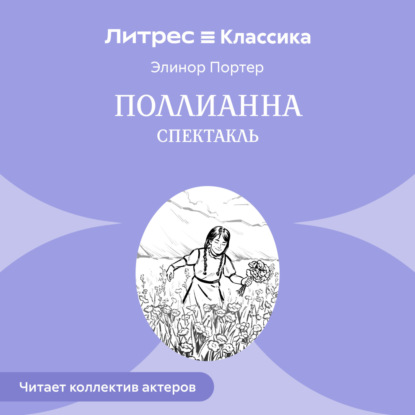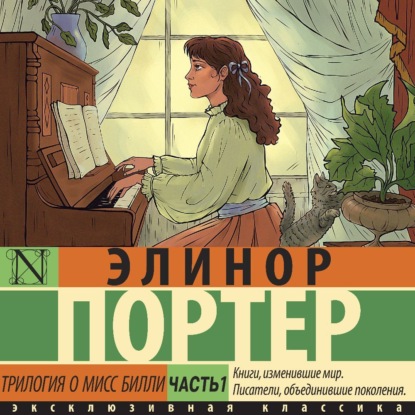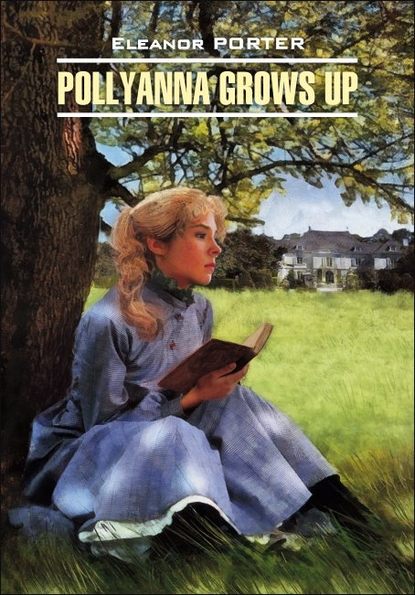
Полная версия:
Элинор Ходжман Портер Поллианна / Pollyanna. Метод интегрированного чтения
- + Увеличить шрифт
- - Уменьшить шрифт

Элинор Портер
Поллианна / Pollyanna. Метод интегрированного чтения
© Матвеев С. А.
© ООО «Издательство АСТ», 2022
Eleanor H. Porter
Pollyanna
Глава I
Мисс Полли
Мисс Полли Харрингтон вошла в kitchen в это июньское утро немного hurriedly. Нэнси, мывшая в sink посуду, in surprise посмотрела.
«Нэнси! Закончи свою утреннюю work, Нэнси, – сказала мисс Полли, – прибери маленькую комнату на attic и поставь там кровать. Подмети комнату и вымой её, конечно, после того как уберёшь boxes. Моя niece, мисс Поллианна Уиттиер, будет скоро у меня здесь live. Ей eleven лет, и она будет спать в той комнате. И не забудь подмести corners, Нэнси», – резко закончила она, когда вышла из комнаты.
«Да, мэм», – вздохнула Нэнси.
В своей комнате мисс Полли снова вынула letter, которое получила два дня назад.
* * *box – коробка
eleven – одиннадцать
hurriedly – спешно
in surprise – удивленно
kitchen – кухня
letter – письмо
live – жить
niece – племянница
sink – раковина
work – работа
Chapter I
Miss Polly
This June morning, Miss Polly Harrington entered her kitchen a little hurriedly. Nancy, who was washing dishes at the sink, looked up in surprise.
“Nancy! Finish your morning work, Nancy,” Miss Polly said, “and clear the little room in the attic and make up the cot bed. Sweep the room and clean it, of course, after you clear out boxes. My niece, Miss Pollyanna Whittier, will soon live with me. She is eleven years old, and she will sleep in that room. Don't forget to clean the corners, Nancy,” she finished sharply, as she left the room.
“Yes, ma'am,” sighed Nancy.
In her own room, Miss Polly once more took out the letter which she had received two days before.
* * *The letter было адресовано мисс Полли Харрингтон, Белдингсвилль, Вермонт; и it read as follows:
«Дорогая мадам,
Вынужден с сожалением inform Вам, что Преподобный Джон Уиттиер скончался две weeks назад, оставив после себя child, девочку eleven лет.
Мне известно, что он был husband Вашей сестры, но он дал мне понять, что ваши семьи were not on the best of terms. Он however подумал, что Вы смогли бы принять эту девочку и bring her up.
Поэтому я Вам и пишу.
С надеждой на Ваш скорый положительный ответ,
С уважением,
Джеремия O. Уайт».
* * *bring her up – воспитать её
child – ребёнок
eleven – одиннадцать
however – однако
husband – муж
inform – сообщить
it read as follows – в нём говорилось следующее
letter – письмо
week – неделя
were not on the best of terms – не очень ладили
* * *The letter was addressed to Miss Polly Harrington, Beldingsville, Vermont; and it read as follows:
“Dear Madam:
I regret to inform you that the Rev. John Whittier died two weeks ago, leaving one child, a girl eleven years old.
I know he was your sister's husband, but he gave me to understand the families were not on the best of terms. He thought, however, that you might wish to take the child and bring her up.
Hence I am writing to you.
Hoping to hear favorably from you soon,
Respectfully yours,
Jeremiah O. White.”
* * *Мисс Полли вчера answered на письмо, и сказала, что она, конечно, возьмёт child. В одном из своих letters Дженни, сестра мисс Полли, написала о Поллианне, своём last baby, все другие её babies умерли. Она named дочку Поллианной в честь двух своих сестёр: Полли и Анны. Через несколько лет пришли новости о death Дженни.
Мисс Полли поднялась с frowning лицом. Она была, of course, довольна, что она добрая женщина, и не только знала свой duty, но и обладала strength характера, чтобы исполнять его. Но «Поллианна»! Что за нелепое name!
* * *answer – ответить
baby – ребёнок (младенец)
child – ребёнок
death – смерть
duty – долг
frowning – нахмуренный
last – последний
letter – письмо
name – имя
of course – конечно
* * *Miss Polly answered the letter the day before, and she had said she would take the child, of course. In one of her letters Jennie, Miss Polly's sister, wrote about Pollyanna, her last baby, the other babies had all died.
She named her “Pollyanna” for her two sisters, Polly and Anna. A few years later they received the news of Jenny's death.
Miss Polly rose with frowning face. She was glad, of course, that she was a good woman, and that she not only knew her duty, but had strength of character to perform it. But – POLLYANNA! – what a ridiculous name!
Глава II
Старый Том и Нэнси
В тот день Нэнси нашла несколько minutes, чтобы всё разузнать в garden у Старого Тома, gardener.
«Мистер Том, вы знаете, что скоро сюда приедет little девочка и будет live у мисс Полли?»
«Что?» – demanded старик.
«Little девочка – чтобы live у мисс Полли. Она сама мне так told, – сказала Нэнси. – Это её niece, ей eleven лет».
The man's jaw fell.
«О, it must be девочка мисс Дженни!»
«Who такая мисс Дженни?»
* * *demand – спросить
eleven – одиннадцать
garden – сад
gardener – садовник
told – сказала
it must be – это должно быть
little – маленький
live – жить
minute – минута
niece – племянница
The man's jaw fell. – У мужчины упала челюсть.
who – кто
Chapter II
Old Tom and Nancy
In the garden that afternoon, Nancy found a few minutes in which to interview Old Tom, the gardener.
“Mr. Tom, do you know that a little girl will soon come here to live with Miss Polly?”
“A-what?” demanded the old man.
“A little girl – to live with Miss Polly. She told me so herself,” said Nancy. “It's her niece; and she's eleven years old.”
The man's jaw fell.
“Oh, it must be Miss Jennie's little girl!”
“Who was Miss Jennie?”
* * *«Она была angel, – прошептал мужчина; – но старым master и mistress она приходилась старшей дочерью. Ей было twenty, когда она вышла замуж и уехала отсюда, это было очень давно. Я слышал, что all её children умерли, кроме last child; и это должно быть как раз та девочка. Интересно, как мисс Полли уживётся в house с child».
«А мне интересно, как девочка уживётся в одном house с мисс Полли!» – snapped Нэнси.
Старик laughed.
* * *all – все
angel – ангел
child – ребенок
children – дети
house – дом
last – последний
laugh – смеяться
master – хозяин
mistress – хозяйка
smile – улыбаться
snap – резко ответить
twenty – двадцать
* * *“She was an angel,” breathed the man; “but the old master and mistress knew her as their oldest daughter. She was twenty when she married and went away from here long years ago. Her babies all died, I heard, except the last one; and that must be her. I wonder what Miss Polly will do with a child in the house.”
“Well, I wonder what a child will do with Miss Polly in the house!” snapped Nancy.
The old man laughed.
* * *«Боюсь, you aren't fond of мисс Полли», – усмехнулся он.
«As if ever anybody could be fond of her!» – угрюмо сказала Нэнси.
«Ты не знала мисс Полли, как я, – сказал Том. – She used to be real handsome, и сейчас бы была, если б захотела».
«Handsome! Мисс Полли!»
«Да, она теперь different, я знаю. Это началось тогда – во время trouble с её возлюбленным, – кивнул Старый Том, – и сейчас she is bitter and prickly to deal with».
«Нэнси!» – раздался sharp voice.
«Д-да, ma'am», – stammered Нэнси и поспешила к дому.
* * *As if ever anybody could be fond of her! – Можно подумать, найдётся кто-то, кому она понравится!
different – другой
ma'am – мэм
sharp voice – резкий голос
she is bitter and prickly to deal with – с ней теперь невыносимо иметь дело
She used to be real handsome. – Она была настоящей красавицей.
slowly – медленно
stammer – бормотать
trouble – неприятность
you aren't fond of – тебе не слишком нравится
* * *“I'm afraid you aren't fond of Miss Polly,” he grinned.
“As if ever anybody could be fond of her!” scorned Nancy.
“You didn't know Miss Polly as I did,” he said. “She used to be real handsome – and she would be now, if she'd let herself be.”
“Handsome! Miss Polly!”
“Yes, she is different now, I know. It began then – at the time of the trouble with her lover,” nodded Old Tom; “and now she is bitter and prickly to deal with.”
“Nancy!” called a sharp voice.
“Y-yes, ma'am,” stammered Nancy; and hurried toward the house.
Глава III
Приезд Поллианны
«Нэнси, – сказала мисс Полли, – завтра в четыре часа приедет моя niece. Ты должна встретить её на station. Тимоти возьмёт коляску и довезёт тебя. В телеграмме говорится: “светлые волосы, redchecked gingham dress и соломенная hat”. Это всё, что я знаю».
На следующий день ровно twenty minutes to four Тимоти и Нэнси поехали в открытой коляске встречать гостью. Тимоти был son Тома.
На station они увидели slender девочку в redchecked gingham dress с двумя длинными fat косичками.
«Вы мисс Поллианна?» – неуверенно спросила Нэнси.
«О, я так рада, рада, рада видеть вас, – eager voice крикнул прямо в ухо. – Конечно, я Поллианна, и я так рада, что вы приехали meet меня! I hoped you would».
Подошёл Тимоти.
* * *son – сын
station – станция
slender – стройный
fat – толстый
niece – племянница
twenty minutes to four – без двадцати четыре
redchecked gingham dress – платье из хлопка в красную клетку
eager voice – нетерпеливый голос
I hoped you would – я надеялась, что вы придёте
hat – шляпка
meet – встретить
Chapter III
The coming of Pollyanna
“Nancy,” Miss Polly said, “my niece will arrive tomorrow at four o'clock. You must meet her at the station. Timothy will take the open buggy and drive you over. The telegram says ‘light hair, redchecked gingham dress, and straw hat.' That is all I know.”
Promptly at twenty minutes to four the next afternoon Timothy and Nancy drove off in the open buggy to meet the expected guest. Timothy was Old Tom's son.
They saw her on the station – the slender little girl in the red-checked gingham with two long fat braids.
“Are you Miss Pollyanna?” Nancy faltered.
“Oh, I'm so glad, GLAD, GLAD to see you,” cried an eager voice in her ear. “Of course I'm Pollyanna, and I'm so glad you came to meet me! I hoped you would.”
Timothy came up.
* * *«Это Тимоти. Возможно, у вас есть trunk», – stammered Нэнси.
«Да, есть, – важно кивнула Поллианна. – У меня есть brand-new trunk. Мне его купила The Ladies' Aid».
Наконец все three отъехали от станции. Trunk Поллианны поместили сзади, а сама Поллианна уютно уселась между Нэнси и Тимоти. Пока все устраивались, маленькая девочка издавала uninterrupted поток комментариев и questions.
«Вот! Isn't this lovely? Это далеко? Надеюсь, что да – я люблю ride, – вздыхала Поллианна. – Какая милая street! Я знала, что будет очень красиво; father говорил мне…»
Она замолчала, её горло перехватил небольшой choking breath. Нэнси увидела, что её chin задрожал, а глаза наполнились tears. Однако через мгновение она затараторила опять, смело подняв head.
* * *brand-new – совершенно новый
chin – подбородок
choking breath – спазм
father – папа
head – голова
I knew it was going to be pretty – я знала, что будет очень красиво
Isn't this lovely? – Разве это не прекрасно?
question – вопрос
ride – ездить
stammer – запинаться
street – улица
tear – слеза
The Ladies' Aid – «Женская помощь» (название благотворительной организации)
three – три
trunk – чемодан
uninterrupted – непрекращающийся
* * *“This is Timothy. Maybe you have a trunk,” she stammered.
“Yes, I have,” nodded Pollyanna, importantly. “I've got a brand-new one. The Ladies' Aid bought it for me.”
The three were off at last, with Pollyanna's trunk in behind, and Pollyanna herself snugly ensconced between Nancy and Timothy. During the whole process of getting started, the little girl kept up an uninterrupted stream of comments and questions.
“There! Isn't this lovely? Is it far? I hope it is – I love to ride,” sighed Pollyanna. What a pretty street! I knew it was going to be pretty; father told me-”
She stopped with a little choking breath. Nancy saw that her small chin was quivering, and that her eyes were full of tears. In a moment, however, she hurried on, with a brave lifting of her head.
* * *«Ну да, father отправился в рай – к mother и к остальным. Он сказал, что я должна радоваться. Но это очень сложно, because он мне нужен. У mother и у остальных есть God и все angels, а у меня нет никого, кроме The Ladies' Aid. Но теперь я уверена, что станет легче, because у меня есть вы, тётя Полли. Я так рада, что у меня есть вы!»
«О, you've made an awful mistake, dear, – неуверенно сказала Нэнси. – Я всего лишь Нэнси. Я не ваша Тетя Полли!»
«Вы – не она?» – stammered девочка.
«Нет. Я всего лишь Нэнси. Я never бы не подумала, что вы примете меня за неё».
Тимоти тихо chuckled.
«Но кто тогда вы?» – спросила Поллианна.
«Я – Нэнси, служанка. Я делаю всю работу, кроме washing и ironing».
* * *angels – ангелы
because – потому что
chuckle – хихикать
father – отец
God – Бог
ironing – глажение
mother – мама
never – никогда
stammer – прошептать
The Ladies' Aid – «Женская помощь» (название благотворительной организации)
washing – стирка
you've made an awful mistake, dear – вы ошибаетесь, дорогая
* * *“Father has gone to Heaven to be with mother and the rest of us, you know. He said I must be glad. But it's pretty hard to, because I need him, as mother and the rest have God and all the angels, while I don't have anybody but the Ladies' Aid. But now I'm sure it'll be easier because I've got you, Aunt Polly. I'm so glad I've got you!”
“Oh, but – but you've made an awful mistake, dear,” she faltered. “I'm only Nancy. I'm not your Aunt Polly!”
“You – you AREN'T?” stammered the little girl.
“No. I'm only Nancy. I never thought you're taking me for her.”
Timothy chuckled softly.
“But who ARE you?” asked Pollyanna.
“I'm Nancy, the hired girl. I do all the work except the washing and ironing.”
* * *«Но тетя Полли есть?» – anxiously просила девочка.
«You bet your life there is», – вмешался Тимоти.
Поллианна visibly расслабилась.
«О, тогда ничего».
Последовало минутное молчание, потом она brightly продолжила: «А знаете что? Я, after all, рада, что она не приехала меня встретить; потому что теперь у меня есть ещё и вы».
«Я – я думала about мисс Полли», – смущённо сказала Нэнси.
Поллианна contentedly вздохнула.
«Я тоже. Она мне так интересна. Знаете, she's all the aunt I've got, и я не знала, что она у меня уже давно. Потом мне father рассказал. Он сказал, что она живёт в красивом big доме «on top of a hill».
* * *about – о
after all – всё-таки
anxiously – тревожно
big – большой
brightly – живо
contentedly – довольно
father – папа
on top of a hill – на вершине холма
she's all the aunt I've got – она – единственная тётя, которая у меня есть
visibly – явно
You bet your life there is. – Ещё как есть.
* * *“But there IS an Aunt Polly?” demanded the child, anxiously.
“You bet your life there is,” cut in Timothy.
Pollyanna relaxed visibly.
“Oh, that's all right, then.”
There was a moment's silence, then she went on brightly: “And do you know? I'm glad, after all, that she didn't come to meet me; because now I've got you besides.”
“I–I was thinking about Miss Polly,” faltered Nancy.
Pollyanna sighed contentedly.
“I was, too. I'm so interested in her. You know she's all the aunt I've got, and I didn't know I had her for ever so long. Then father told me. He said she lived in a lovely great big house “on top of a hill.”
* * *«Так и есть. Вы можете now его увидеть, – сказала Нэнси. – Это вон тот большой white дом с зелёными blinds».
«О, какой милый! И как много деревьев и grass вокруг него! Я никогда не видела столько зелёной grass. Моя тётя Полли rich, Нэнси?»
«Да, мисс».
«Я так рада. Должно быть, здорово иметь много money. У тёти Полли бывает по воскресеньям ice-cream?»
«Нет, мисс. Вашей тёте не нравится ice-cream».
Face Поллианны fell.
«О, вот как? Мне так жаль! Возможно, тогда у тёти Полли есть carpets».
«Да, у неё есть carpets».
* * *blinds – ставни
carpet – ковёр
face fell – лицо вытянулось от изумления
grass – трава
ice-cream – мороженое
money – деньги
now – сейчас
rich – богатый
white – белый
* * *“She does. You can see it now,” said Nancy. “It's that big white house with the green blinds.”
“Oh, how pretty! – and what a lot of trees and grass all around it! I never saw such a lot of green grass. Is my Aunt Polly rich, Nancy?”
“Yes, Miss.”
“I'm so glad. It must be perfectly lovely to have lots of money. Does Aunt Polly have ice-cream Sundays?”
“No, Miss. Your aunt doesn't like ice-cream.”
Pollyanna's face fell.
“Oh, doesn't she? I'm so sorry! Maybe Aunt Polly has got the carpets, though.”
“Yes, she's got the carpets.”
* * *«В every комнате?»
«Ну, почти в every комнате», – ответила Нэнси, думая о комнате на attic, где никакого carpet не было.
«О, как я рада, – ликовала Поллианна. – Я люблю carpets. А у миссис Уайт были ещё pictures: там очень красивые roses и маленькие девочки на коленях, а также kitty, ягнята и lion. Вы разве не любите pictures?»
«Я не знаю», – ответила Нэнси.
«А я люблю. Но у нас не было никаких pictures. My! Разве это не потрясающе beautiful дом?» – переменила она тему.
* * *attic – чердак
beautiful – красивый
carpet – ковёр
every – каждый
kitty – котёнок
lion – лев
My! – О Боже!
pictures – картина
rose – роза
* * *“In every room?”
“Well, in almost every room,” answered Nancy, thinking about the attic room where there was no carpet.
“Oh, I'm so glad,” exulted Pollyanna. “I love carpets. And Mrs. White had pictures, too, perfectly beautiful ones of roses and little girls kneeling and a kitty and some lambs and a lion. Don't you just love pictures?”
“I don't know,” answered Nancy.
“I do. But we didn't have any pictures. My! but isn't this a perfectly beautiful house?” she broke off.
Глава IV
Маленькая комната на чердаке
Мисс Полли Харрингтон не встала, чтобы встретить niece.
«Как дела, Поллианна? Я…»
«О, тётя Полли, тётя Полли, я не знаю, до чего рада, что вы позволили мне приехать live у вас, – девочка was sobbing. – Вы не представляете, how perfectly lovely it is, что у меня есть вы и Нэнси и всё это!»
«Нэнси, you may go», – сказала тётя Полли.
«Мы пойдём наверх в твою room, Поллианна. Думаю, что твой trunk уже там. Я велела Тимоти поднять его наверх – если у тебя был trunk. You may follow me».
Ничего не говоря, Поллианна turned и вышла за своей тётей из комнаты. Её глаза наполнились tears, но подбородок был bravely вздёрнут.
* * *bravely – смело
how perfectly lovely it is – как это прекрасно
live – жить
niece – племянница
room – комната
sob – всхлипывать
tear – слеза
trunk – чемодан
turn – повернуться
You may follow me. – Следуй за мной.
you may go – ты можешь идти
Chapter IV
The little attic room
Miss Polly Harrington did not rise to meet her niece.
“How do you do, Pollyanna? I-”
“Oh, Aunt Polly, Aunt Polly, I don't know how to be glad enough that you let me come to live with you,” she was sobbing. “You don't know how perfectly lovely it is to have you and Nancy and all this!”
“Nancy, you may go,” Aunt Polly said.
“We will go upstairs to your room, Pollyanna. Your trunk is already there, I presume. I told Timothy to take it up – if you had one. You may follow me.”
Without speaking, Pollyanna turned and followed her aunt from the room. Her eyes were filled with tears, but her chin was bravely high.
* * *Она была уже на лестнице.
«О, тётя Полли, тётя Полли, – breathed девочка; – какой чудесный, прекрасный house! Как вы должны быть ужасно рады, что настолько rich!»
«Поллианна! – ejaculated тётя. – Я удивлена! Ты – making a speech like that?»
«Но ведь, тётя Полли, разве это не так?» – in wonder спросила Поллианна.
«Конечно, нет, Поллианна. Как я могу гордиться дарами, которые посылает мне Lord?» – заявила леди.
Мисс Полли отвернулась и прошла по коридору к лестнице на attic. Наверху лестницы были innumerable сундуки и boxes. Было жарко. Поллианна задрала голову higher – воздух был настолько спёртым. Потом она увидела, как тётя распахнула door справа.
* * *attic – чердак
box – коробка
breathe – вздыхать
door – дверь
ejaculate – извергнуть
higher – выше
house – дом
in wonder – удивлённо
innumerable – бесчисленный
Lord – Господь
making a speech like that – говорить подобное
rich – богатый
stairway – лестница
* * *She was on the stairway now.
“Oh, Aunt Polly, Aunt Polly,” breathed the little girl; “what a perfectly lovely, lovely house! How awfully glad you must be you're so rich!”
“Pollyanna!” ejaculated her aunt. “I'm surprised at you – making a speech like that to me!”
“Why, Aunt Polly, AREN'T you?” asked Pollyanna, in wonder.
“Certainly not, Pollyanna. How can I be proud of any gift the Lord has sent me?” declared the lady.
Miss Polly turned and walked down the hall toward the attic stairway door. At the top of the stairs there were innumerable trunks and boxes. It was hot. Pollyanna lifted her head higher – it seemed so hard to breathe. Then she saw that her aunt threw open a door at the right.
* * *«Вот, Поллианна, вот твоя room, а вот твой trunk. У тебя есть ключ?»
Поллианна кивнула. Её глаза были несколько расширены и frightened.
Её тетя frowned.
«Когда я задаю question, Поллианна, я предпочитаю, чтобы ты answer мне голосом, а не with your head».
«Да, тётя Полли».
«Спасибо, уже лучше. Думаю, у тебя есть everything, что тебе здесь потребуется», – добавила она. «Я пошлю Нэнси помочь тебе разобрать trunk. Ужин в six часов», – закончила она и вышла из room.
For a moment Поллианна замерла. Потом она обернула свои широкие eyes к bare стене, bare полу, bare окнам и упала на knees, закрыв лицо руками.
* * *answer – отвечать
bare – голый
everything – всё
eye – глаз
for a moment – на мгновение
frightened – испуганный
frown – хмуриться
with your head – головой
knee – колено
question – вопрос
room – комната
six – шесть
trunk – чемодан
* * *“There, Pollyanna, here is your room, and your trunk is here. Do you have your key?”
Pollyanna nodded. Her eyes were a little wide and frightened.
Her aunt frowned.
“When I ask a question, Pollyanna, I prefer that you should answer aloud not merely with your head.”
“Yes, Aunt Polly.”
“Thank you; that is better. I believe you have everything that you need here,” she added. “I will send Nancy to help you unpack your truck. Supper is at six o'clock,” she finished and left the room.
For a moment Pollyanna stood quite still. Then she turned her wide eyes to the bare wall, the bare floor, the bare windows and fell on her knees, covering her face with her hands.
* * *Когда через несколько minutes Нэнси поднялась наверх, она её в такой позе и застала.
«There, there, you, poor lamb», – запричитала она, притягивая девочку к себе.
«О, Нэнси, я такая wicked, – рыдала Поллианна. – Я вот только не могу понять, почему God и ангелам мой father нужнее, чем мне».
«Ну-ну, дитя, давай сюда key, мы откроем этот trunk и вынем твои платья».
Поллианна вытащила key.
«Там их не очень много», – faltered она.


